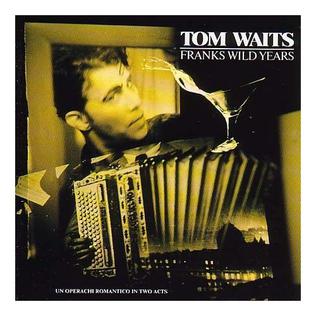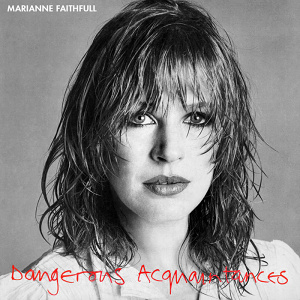
Marianne Evelyn Gabriel Faithfull is an English rock singer-songwriter and actress. She achieved popularity in the 1960s with the release of her hit single "As Tears Go By" and became one of the lead female artists during the British Invasion in the United States.

Robert Wolfe Quine was an American guitarist. A native of Akron, Ohio, Quine worked with a wide range of musicians, though he himself remained relatively unknown. Critic Mark Deming wrote that "Quine's eclectic style embraced influences from jazz, rock, and blues players of all stripes, and his thoughtful technique and uncompromising approach led to rewarding collaborations with a number of visionary musicians."

Franks Wild Years is the tenth studio album by Tom Waits, released 1987 on Island Records. It is the third in a loose trilogy that began with Swordfishtrombones. Subtitled "Un Operachi Romantico in Two Acts", the album contains songs written by Waits and collaborators for a play of the same name. The play had its world premiere at the Briar St. Theatre in Chicago, Illinois, on June 22, 1986, performed by the Steppenwolf Theatre Company. "If I Have to Go" was used in the play, but released only in 2006 on Orphans: Brawlers, Bawlers & Bastards. The theme from "If I Have to Go" was used under the title "Rat's Theme" in the documentary Streetwise as early as 1984. The title is derived from "Frank's Wild Years", a track from Swordfishtrombones.

Hal Willner was an American music producer working in recording, films, television, and live events. He was best known for assembling tribute albums and events featuring a wide variety of artists and musical styles. Willner died during the COVID-19 pandemic from complications brought on by the virus.

Steve Weisberg is an American composer, pianist, recording artist, and producer. In the 1980s, after studying with Michael Gibbs at Berklee College in Boston, Massachusetts, he recorded the XtraWatt/ECM release "I Can't Stand Another Night Alone ," produced by Carla Bley and Steve Swallow, recorded and performed with Karen Mantler and her Cat Arnold, and contributed arrangements for Hal Willner's Lost in the Stars: The Music of Kurt Weill (A&M). He was also a member of infamous Boston band Sons of Sappho. In addition, he has contributed music to the films Atlas Shrugged - Part 1,Things to Do in Denver When You're Dead, Don't Say a Word, Impostor, Runaway Jury, Bewitched, the 2006 documentary The Ground Truth, Step Brothers, The Express: The Ernie Davis Story, and the documentary Banner On The Moon.

Broken English is the seventh studio album by English singer Marianne Faithfull. It was released on 2 November 1979 by Island Records. The album marked a major comeback for Faithfull after years of suffering due to drug abuse, homelessness, and anorexia. It is often regarded as her definitive recording and Faithfull herself has described it as her "masterpiece".

Storm Force Ten is the tenth studio album by British folk rock band Steeleye Span, released in 1977 by Chrysalis Records. Until their 2013 album Wintersmith, released 36 years after Storm Force Ten, this album was the band's last production to reach the charts, topping out at 191 on Billboard's Pop charts. After Rocket Cottage, Bob Johnson and Peter Knight left the band. As there was still a contractual obligation, they invited Martin Carthy back again. Back in 1971 when Martin Carthy had joined he had recommended John Kirkpatrick but they decided on fiddler Peter Knight instead. This time they accepted his recommendation and Kirkpatrick's fiery accordion playing replaced Knight's fiddle.

Before the Poison is the sixteenth studio album by British singer Marianne Faithfull, recorded in 2003 and released in France on 28 September 2004, and in the United States on 25 January 2005.

Orphans: Brawlers, Bawlers & Bastards is a limited edition three CD set by Tom Waits, released by the ANTI- label on November 17, 2006 in Europe and on November 21, 2006 in the United States.

Kissin Time is the 15th studio album by British singer Marianne Faithfull.

Dangerous Acquaintances is the eighth studio album by English singer Marianne Faithfull. It was released on 1 September 1981 by Island Records. The album was seen by reviewers as a disappointing follow-up to Faithfull's Broken English, as the album trades the angry and controversial alternative new wave arrangements of the previous one for a more mainstream rock texture, using over a dozen session musicians and, for some, giving a certain anonymous feel to the songs. The title is a reference to the Pierre Choderlos de Laclos 1782 novel Les Liaisons dangereuses.

City Lights is an album by Dr. John, his first for Horizon Records. It was released in 1978.

Easy Come, Easy Go is a studio album of cover versions by English singer Marianne Faithfull, which was released in the EU on 10 November 2008. The album is produced by Hal Willner and features guest appearances from a variety of musicians. It was released as both a standard 10-track CD and a special 18-track edition with a DVD documentary by Anne Rohart under Jean-Baptiste Mondino's artistic direction, with both Faithfull and Wilner commenting on the song selection. A collectible 2-disc vinyl pressing is also available. The album was recorded with Pro Tools in NYC at the Sear Sound Studio.

20th Century Blues is a live 1996 album by English singer Marianne Faithfull, in collaboration with pianist Paul Trueblood.

Horses and High Heels is the 18th studio album release by British singer Marianne Faithfull. The 13-track album was released on 31 January 2011 in continental Europe and on 7 March 2011 in the UK on the Dramatico record label. It was released in the United States on 28 June 2011 via the French Naïve Records label.
September Songs – The Music of Kurt Weill is a music video of 94 minutes recorded in 1994 for Rhombus Media, ZDF (Germany), CBC (Canada) and RTP (Portugal). It was produced and directed by Larry Weinstein, and written by Weinstein and David Mortin. The film was conceived as a follow-up to the album Lost in the Stars: The Music of Kurt Weill whose producer Hal Willner served as the music supervisor in this project. The film was nominated for the 1995 Emmy Awards for Outstanding Cultural Program; it won five Gemini Awards in 1997. An album was released in 1997.

Blazing Away is a live album by British singer Marianne Faithfull, released on the Island label in 1990.
Robert Burger is an American composer, arranger, multi-instrumentalist, and music director.

Amarcord Nino Rota is an album by various artists, recorded as a tribute to composer Nino Rota.

Negative Capability is the twentieth studio album by British singer Marianne Faithfull. It was released on 2 November 2018, and produced by Rob Ellis, Warren Ellis and Head. Described as her "most honest album", songs on Negative Capability deal with themes of love, death, as well as terrorism and loneliness. She revisits three old recordings: "It's All Over Now, Baby Blue" from Rich Kid Blues, recorded in 1971 under the title Masques, which is her 'lost' album and was not released until 1985; "Witches Song", from 1979's comeback album Broken English; and "As Tears Go By", which started her career as a 17-year-old. Faithfull recorded it for the second time aged 40 on 1987's Strange Weather. The rest of the songs are, with one exception, all new and co-written by Faithfull with help from some of her long time collaborators like Nick Cave and Ed Harcourt. The "Loneliest Person" is a cover of a Pretty Things composition from their 1968 album S.F. Sorrow.


















